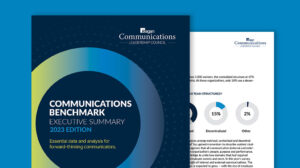How your PR and comms team can help with the ‘Great Resignation’
Now is the time to build your external reputation as an employer and HR innovator.

“When we come into contact with life-threatening events, we tend to reflect on death and consider whether we are happy with our lives or whether we would like to make changes to them. The pandemic forced [people] to take stock of their lives and gave them the opportunity to reimagine it.” – Anthony Klotz, management professor for Texas A&M University, via CNBC
October 2021 saw the expansion of a groundbreaking shift in the way the United States does business. A whopping 2.9% of the entire workforce, or 4.3 million people, had quit their jobs according to a report by the U.S. Bureau of Labor Statistics. Analysis from the Harvard Business Review found the highest percentage of resignations landed in the tech and health care sectors.
As your organization weathers turnovers and ongoing changes in its HR policies and work-life culture, here’s how corporate communications and PR teams should be tapped to effectively navigate the Great Resignation and attract and retain top talent:
1. Position your organization as an HR innovator.
Your PR agency or communications teams should have strategies in place for communicating the wins of your organization, but are you also focusing on HR wins? It’s important to put your organization forward for key workplace awards to recognize the hard work of your “people” and “culture” departments. These showcase how your team focuses on both its product and the team that makes it happen.
Also important to attract top talent are effective campaigns about policies your company is implementing for its employee health. Share press releases about new work-life policies, create teams to strategize on employee-driven improvements to your culture, and share the work of those efforts with your audiences.
Don’t forget to apply an understanding of workplace needs to your hiring strategies. When talking about which positions you’re seeking, incorporate language that represents a diverse, equitable and inclusive perspective from your company. If people are seeking new opportunities, your corporate communications and PR teams can help make your organization the attractive alternative a job seeker is looking for.
2. Showcase your company’s growth.
As always, don’t shy away from talking about your company’s growth and key milestones. Sharing press releases and being featured in industry publications for your innovative work and thought leadership will help set your organization apart to attract top talent.
Make sure you’re also showcasing your passion for people. Customer success stories about the strength of your relationships and ability to effectively serve your industry will also interest a job seeker who might have been dissatisfied with their ability to make a positive impact in their work previous roles.
3. Identify industry shortcomings for employees—and address them.
If tech employees are leaving companies in droves, there have to be lessons to learn about how to make improvements that stem the tide. Take time to identify key sticking points for employees in your industry and find ways to innovate. This can be through employee-led initiatives, industry surveys, or social listening and conferences.
Then, share your story.
Employees will be eager to hear how you’re thinking about their top concerns or struggles and what you’re doing to fix the problem. This will also benefit your stakeholders and investors, who value ESG excellence as part of your organization’s key storytelling.
Aim for the middle
Lastly, think about how you can create meaningful messaging for your mid-level employees. The Harvard Business Review found resignation rates are highest among mid-career employees.
What does your organization have to attract someone mid-career? Think about implementing tactics that can speak to happy employees who wouldn’t be top earners or entry-level employees at your organization. Then, target them through a meaningful communication strategy from your corporate and PR teams to develop recruitment tactics for these essential contributors to your organization’s success.
Kathryn Arnold is a Senior Account Executive at Swyft, a PR and marketing agency focused on tech startups.







This article highlights not only the effects of the “Great Resignation” but gives vital tips to employers on how to grow their business. The paragraph on key storytelling resonated with me and creating meaningful messaging.